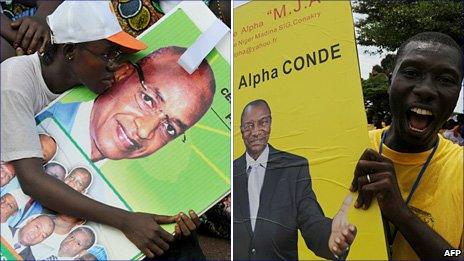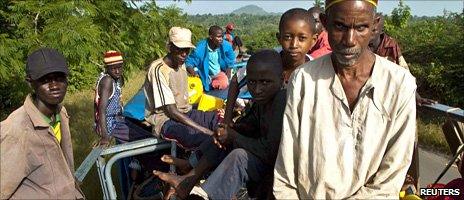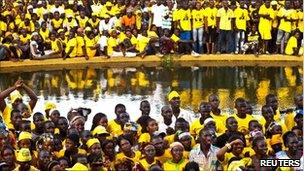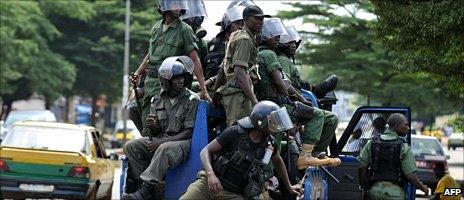Can Guineans grab hold of democracy?
- Published

Barring last minute hitches, Guineans will vote on Sunday in a long-delayed run-off poll to elect their president in the West African nation's first democratic election since independence in 1958.
A combination of incompetence on the part of the electoral commission, disagreements between the two presidential candidates and violence between rival supporters have delayed the poll that should have been held two weeks after the first round in June.
Now, after four postponements and the appointment of a new head of the electoral commission, the stage finally seems set.
"I can now safely say that all is now ready for the holding of election on Sunday 7 November," new electoral commissioner Toumany Sangare, a Malian-born army general, told the press this week.

Peul people in northern Guinea have been fleeing their homes in the last week, but polling stations have been organised for the displaced
Former Prime Minister Cellou Dalein Diallo of the Union of Democratic Forces of Guinea (UFDG) and veteran opposition leader Alpha Conde of the Rally of the Guinean People (RPG), who came first and second respectively from a pack of 24 contestants in the first round, will slug it out for the country's top job.
Ethnic divide
But the fact that the two men represent the two most populous ethnic groups in the country has marred the run-up to the poll.
Mr Diallo represents the Peul ethnic group (also known as the Fula) while Mr Conde wears the crown for the Malinkes.
There have been two serious clashes between their supporters during the campaign - the second only a week ago, provoking the large-scale displacement of Peul from areas of Upper Guinea in the Malinke heartland.
This led to the banning of campaigning for Sunday's poll.
Despite the problems, Guineans generally are determined to vote in a new president, who they hope can improve their lives.
"We will vote for a new president in spite of the threats posed by violence as this is the only way forward for this nation," Jalikatou Sankhon, a housewife in the capital, Conakry, told the BBC.
Mahmoud Diallo, who sells radio sets in the city, agreed.
"We are prepared to vote because whoever wins, Cellou or Alpha, it's Guineans who should take pride in the fact that they've finally ushered in real democracy in their country after over half-a-century."
Rich but poor

Campaign rallies have been banned this week to avoid further tensions
The international community including individual countries like the US, France and the UK, and institutions including the African Union, West African body Ecowas, the European Union and others have backed the democratic effort from day one and are still committed.
Guinea has the largest deposits of bauxite in the world but poor management and corruption by the previous two dictatorial regimes of first President Sekou Toure and then Lansana Conte have rendered Guineans among the poorest on the continent and indeed the world.
This is why both candidates have both pledged to make raising living standards for the average Guinean a top priority.
"I will restore the dignity of Guineans commensurate to the potential wealth the country possess and this includes ensuring that every Guinean gets three square meals a day," Mr Diallo promised.
For his part, Mr Conde told his supporters: "The average Guinean has no business living in such abject poverty and squalor in the midst of plentiful resources and that will be a priority for me as president."
Guinea has remained on the bottom rung of the global index on countries' economic performance despite its potential mineral wealth and human resources.
This is why the international community has taken the trouble to help ensure that, in the words of one EU official, "Guinea returns to the fold of civilised nations".

Security is tight in Conakry ahead of the poll
And this could well be the case by Sunday evening at the close of polling, particularly with Gen Sangary at the head of the electoral commission - a man in whom Guineans appear to have total confidence.
When a new civilian president is finally in place, it will end decades of military influence in the governance of this country.
Current interim military leader Gen Sekouba Konate, unlike previous military rulers, has showed immense willingness to hand over political power to where it belongs - to civilians.
- Published28 September 2010
- Published23 October 2010
- Published25 June 2010